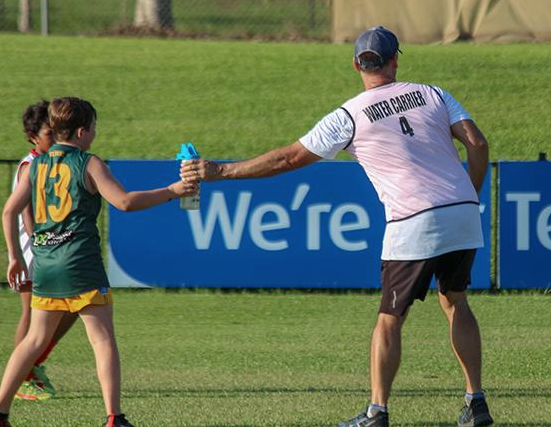A ban on waterboys at junior footy games has one local grandfather all riled up.
Peter Emmanuel is ropeable the West Australian Football Commission hasn’t allowed the return of water carriers to junior matches along with the easing of other pandemic restrictions.
“I just think it’s so wrong,” he said.
“We’ve moved on from the pandemic. And I think this rule is endangering kids’ health.”
According to the 2024 Quick Rules handbook for the Perth Football League, up to four water carriers are allowed on ground during a senior footy match.
But the same liberty is not given to juniors.
“Water carriers are not permitted in Junior Community Football in Western Australia unless explicitly permitted by WAFC Community Football staff in circumstances of extreme heat,” the WAFC states in its 2023 junior competition handbook.
The Examiner queried this discrepancy.
“Senior games quarters last for 25-30+ minutes each whilst junior games are between 10-15 minutes max. Players are rotated regularly and can come to the bench for water if required,” Executive Manager Game Development and Community Football Troy Kirkham explained.
“The runner can take water out if absolutely required or the players can come to the sideline for water if required.”
But Mr Emmanuel said his Under 14s grandson runs around non-stop for 20 minutes a quarter – consistent with the WAFC’s own match duration rule.
He also argued that teams are only allowed a certain number of player rotations per game.
“It’s not used for water purposes – the interchange is used for tactics,” he said.
“And you can’t expect a player to stop playing and run to the side for a drink – the game is quick when they get to that age. If you’re going over to get a drink, you could lose the game.”
The WAFC’s Mr Kirkham said the rule had been in place for around five years now and that they’d had nothing but thumbs up from clubs and parents.
“The feedback from clubs is extremely positive as it reduces game day environment issues like umpire abuse and reduces the numbers of volunteers required on game day,” he said.
“We haven’t had any negative feedback from parents. Parents understand the encouragement to not share water bottles from a health and safety perspective.”
But Mr Emmanuel said he’d heard parents, coaches and even scouts voice the same concerns as him.

“It’s the juniors that need the water because they dehydrate really quickly,” he said.
To emphasise the seriousness of the issue, he pointed to the recent coronial inquest into the death of 20-year-old NRL player Keith Titmuss, which found he died of Exertion Heat Stroke after an “inappropriately difficult” pre-season training session.

What is Exertional Heat Stroke?
Exertional Heat Stroke (EHS) is rare but can happen when a person pushes themselves too hard through physical activity.
The overheating of organ tissues can short-circuit the temperature-control centre in the brain, cause circulatory failure, and/or release endotoxins into the bloodstream.
It’s life threatening and can be fatal unless recognised and treated.
Signs and symptoms include an increased heart rate, low blood pressure, sweating, trouble breathing, an altered mental state, vomiting, diarrhea, seizures, and coma.
EHS often happens in hot or humid climates, but not always. Keith Titmuss died after a gruelling pre-season training session in what has been described as ‘mild’ 24-degree weather.
Mr Emmanuel said he believes it’s only a matter of time before something like that happens here.
“With the weather we’ve been having, they’re not getting any cooler days to play on and they’re sweating like buggery,” he said.
“It’s in the Football Commission’s duty of care to ensure the health of the players.
“The guys who run this whole thing need to have a rethink.”
We asked the WAFC if they’d consider revising the ban. Their response, while not set in stone, indicated reluctance.
“The rule as it currently stands enhances the game day environment for players, umpires and spectators alike and reduces the need for volunteers, whilst creating safer environments for the participants,” Mr Kirkham said.














